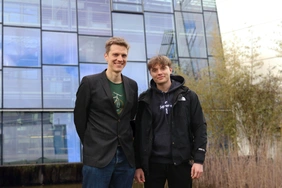"Astronaut playing football on the moon" types Dominic Rampas with nimble fingers on his laptop. A short time later, his AI tool has created four high-resolution, highly detailed images of a footballing astronaut. Rampas has always enjoyed programming and tinkering. It was therefore clear to the 22-year-old from Neuzelle near Berlin that he would opt for the Bachelor's degree program in Artificial Intelligence at THI, which is located at the interface between machine learning, data analysis, and the development of intelligent, self-learning systems. To practice, he reprogrammed freely accessible articles. "It's quite difficult to convert language into programming," says Rampas. "Only those who have the code know how it works in the end."
In a forum, Rampas met the Spanish researcher Pablo Pernías. Together they developed a very efficient text-to-image model. The working title of the first version: Paella. "The AI was amazingly good at generating images of food," explains Rampas. "Because it doesn't matter whether a potato is on the left or right. It's different with faces. It's immediately noticeable if an eye is in the wrong place." This led to the name "sausage" for the second version, which immediately brought him and Pernías a lot of attention in the AI community. Rampas later brought Marc Aubreville, Professor of Image Understanding and Medical Applications of Artificial Intelligence, on board. Together with Dr Mats L. Richter, who conducts research in Canada, Aubreville accompanied the rest of the process.
As a research team, the four submitted a paper to the International Conference on Learning Representations (ICLR), one of the world's most important conferences on AI, at the end of 2023. Of the around 7200 proposals received, around 2200 were accepted, 87 as a presentation - including "Würstchen". Rampas, who is currently completing his Bachelor's degree, is already a little nervous. But he is also looking forward to the challenge of presenting his AI to an international audience of experts. 2024 promises to be exciting for him anyway: First Ingolstadt, then ICLR in Vienna, and finally Silicon Valley in California. Dominic Rampas will take up his first job there this year, at the epicentre of AI innovation.


![[Translate to English:] Logo Akkreditierungsrat: Systemakkreditiert](/fileadmin/_processed_/2/8/csm_AR-Siegel_Systemakkreditierung_bc4ea3377d.webp)








![[Translate to English:] Logo IHK Ausbildungsbetrieb 2023](/fileadmin/_processed_/6/0/csm_IHK_Ausbildungsbetrieb_digital_2023_6850f47537.webp)


